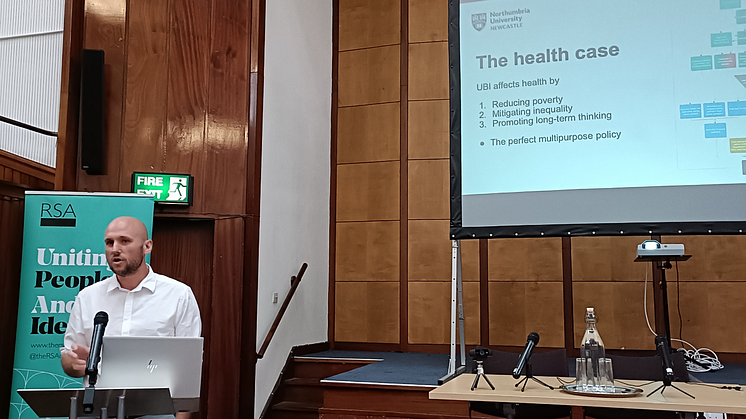
Press release -
Groundbreaking research finds Basic Income scheme could save NHS tens of billions of pounds
New research funded by the National Institute for Health and Social Care Research (NIHR) and led by Northumbria University has found that a Basic Income scheme could potentially save the NHS tens of billions of pounds.
Researchers at the Universities of Northumbria, York, Bath and Strathclyde, in collaboration with think tanks Compass and Autonomy, have presented groundbreaking evidence on the role that Basic Income can play in dealing with our public health crisis.
A new report called Treating causes not symptoms: Basic Income as a public health measure uses a range of economic and health modelling, public opinion surveys and community consultation to present cutting-edge evidence on the impact of Basic Income schemes.
A basic income is a regular and unconditional cash payment to all individuals designed to reduce poverty, enhance economic security and improve overall well-being.
As a result of these potential benefits, researchers have looked at the knock-on effects for the economy and public health.
Economic impact:
- Even a more ‘modest’ basic income scheme (£75 a week, £3,900 a year) would reduce child poverty to the lowest level since comparable records began in 1961 and achieve more at significantly less cost than the anti-poverty interventions of the New Labour governments.
- Child and pensioner poverty down by at least 60% each
- Working age poverty down by between 29% and 75% depending on the scheme
- Inequality down 55% to the lowest in the world under the most ambitious scheme
Public health impact:
- Between 125,000 and 1 million cases of depressive disorders could be prevented or postponed.
- Between 120,000 and 1.04 million cases of clinically significant physical health symptoms could be prevented or postponed.
- Between 130,000 and 655,000 quality-adjusted life years (QALYs) could be gained, valued at between £3.9 billion and £19.7 billion.
- Based on depressive disorders alone, NHS and personal social services cost savings in 2023 of between £125 million and £1.03 billion assuming 50% of cases diagnosed and treated.
According to new polling, the report also found that the British public prefers a more generous Basic Income scheme that significantly reduces poverty and inequality and improves physical and mental health. They want to fund those schemes through new wealth and carbon taxes and increased corporation taxes, but also view small increases in income tax as tolerable.
Matthew Johnson, Professor of Public Policy at Northumbria University, and the project lead, said: “The findings of this report are clear: there is no obvious alternative to Basic Income that has the same multipurpose impact across society.
“These first indications of public health impact are debate shifting, while evidence on British public opinion present clear pathways to funding through wealth, carbon and corporation tax increases.
“This should encourage administrations, such as in Wales and Greater Manchester, which have expressed support for policies like this.”
Kate Pickett, Professor of Epidemiology, University of York, and the author of The Spirit Level, said: “Given decades of measurable failure, it should be clear that people in local communities affected by poverty, insecurity and lack of opportunity are the authoritative voice on what they need to enhance their health and wellbeing.
“We need to listen to their expressed needs and lived experience and create policies that support them to flourish.”
Dr Jonathan Coates, GP in Newcastle upon Tyne and NIHR In-Practice Fellow, Durham University, said: “As a GP, I increasingly find that my patients are in financially precarious positions, regardless of whether they are in work or on benefits, and this has a clear impact on their physical and mental health.
“Basic Income represents an opportunity to follow in the footsteps of previous bold interventions to address the causes, not the symptoms, of illness.”
The report, a full copy of which can be found here, was officially launched at an event held at Northumbria University’s City Campus East in Newcastle upon Tyne on Thursday 13 July. Full event details can be found here.
It follows proposals from the research team to pilot a Basic Income in two communities – Jarrow and East Finchley – which attracted significant media interest.
Ends
Notes to editors
- Participants taking part in the new polling, referred to in the report, were recruited via prolific.co and involved a sample size of 697 UK Adults.
Topics
Categories
UNIVERSITY OF THE YEAR 2022 (Times Higher Education Awards)
Northumbria is a research-intensive university that unlocks potential for all, changing lives regionally, nationally and internationally. Find out more about us at www.northumbria.ac.uk
--- Please contact media.communications@northumbria.ac.uk with any media enquiries or interview requests ---








